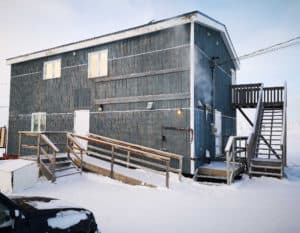Over the next six months, Pinnguaq plans to hire between three to six positions in Nunavut. This will add to the staff we have in Pangnirtung and be our first staff in Iqaluit. Our first position is already posted – it was the process of putting it together that got me thinking we should share about it publicly.
Although our current Pangnirtung are kind enough to work out of their homes, not everyone can do that. What about when we hire in a community in which we don’t have office space or existing employees? Nunavut is 25 isolated communities, and we need to serve all of them. We needed a lot of help to get the first position posted, and the next few positions are going to be no easier. Let’s talk about why.
The Cost of Living
Despite never being large enough to qualify in any of the fancy graphs that people make about the cost of rent in the country, I’m going to go out on a limb and say that Nunavut is by far the most expensive place to live in Canada. The waiting list for public housing averages two years – available units in the private sector average from $1,500 for a bachelor to $2,500 for a two bedroom. The cost of food is three times the national average, and a flight from Iqaluit to Ottawa (3 hours) often costs more than a flight from Ottawa to Sydney, Australia (24 hours).

All of this means that if someone is going to work in Nunavut, they need to make enough money to survive.
The Government of Nunavut
The Government of Nunavut is the largest employer in the territory, no contest. As such, they (through the advocacy of the Nunavut Employees Union) set the wages that the territory comes to expect. The reality is, with few exceptions (mining, Nunavut crown corporations, and NGOs) the Government of Nunavut is the only employer in the territory that can pay the wages they are setting. The government also pays a Northern Allowance (about $15K in Iqaluit, higher in other communities), so looking at the average salaries (and adding a Northern allowance), you can see you need around $100K to stay competitive. There is no shortage of jobs in Nunavut, in fact, we have the highest job vacancy rate in Canada. The GN is constantly struggling to fill the dozens of jobs it has available and often the best talent is just shifting from available position to available position.

Office Space
Remember that conversation about the cost of living in Nunavut? Multiply that by a number so big you just spit frustration, when you’re talking about office space. What little there is will cost you $30K to $40K a year at best, not to mention the highest costs of power and the slowest (and most expensive) internet in the country. Every penny you put into the office space is money that could be going to make your wage more competitive, so it’s a difficult balance to strike.

What This Means
All of this leads to the challenge of trying to find the best talent that isn’t already in a government job, pay them a rate they can survive on (while accepting it’s nearly impossible to match GN rates), and house them in an office space that doesn’t bankrupt you. We aren’t waiting for the three concerns listed above to be solved. Nor do we have an easy solution to suggest. This is the reality of Nunavut and there is no quick fix.

What we are doing is building within those constraints, with an understanding of those issues and finding success. This means always thinking on our toes, being creative, working out of homes, and creating work that people are willing to sacrifice a little pay for a lot of job satisfaction. Most importantly, it means being open and having partnerships with every possible organization who has an interest in Nunavut. We’re all in this together.
Partners, Partners, Partners
In order for the position we currently have posted to work, we had to create an alliance of three different organizations. In addition to the funding we could bring to the table, York University had funding for a position promoting a program that fits within our mission statement called I-SPARX, which we will be leading in Nunavut and sharing very shortly. That allowed us to create a wage of $85K for this position, not too shabby by private industry standards in Nunavut. Next, we needed an office space. For that, we created a partnership with the Embrace Life Council (also partners on I-SPARX and our te(a)ch program) and found an empty office and a supervisor in the form of Executive Director Kim Masson to help us out. It’s an ideal scenario and it allowed us to create one position.

Now we’ve got between two to five more we want to fill. We also have a mandate and a program in te(a)ch that is going to require us to be in almost every community in the territory. This means we need to continue to expand our partner base and find allies who want to help, and who we can help in turn. Broadband companies, airlines, organizations with a spare desk, organizations with similar mandates – if you exist, we want to work with you.
Pinnguaq’s mission relates to many industries and partnerships can be invaluable on both sides. Let’s talk, let’s build.



